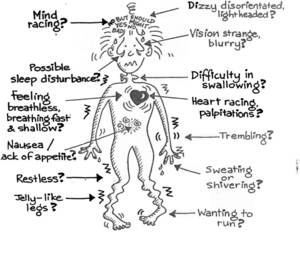Stress, or as it may be referred to “anxiety,” is a normal response to changes that we experience through everyday activities. The term “stress” is normally used to describe negative situations, which has led us to believe that stress is something to avoid. While it is true that an excessive amount of stress can be harmful to ones physical and mental abilities, stress is not always a negative reaction to life.
There are two distinct types of stress. Distress is what we normally think of when discussing stress. Eustress (pronounce YOU-stress), however, is a positive type of stress. I like to think of eustress as being in the “zone.” The zone is a place where things flow well psychologically, physically and biologically.
Eustress may be categorized as something that helps to motivate and helps to focus energy. It is normally short term, feels exciting and helps to improve performance. We could also say that eustress helps us to use our developed positive coping skills.
Examples of eustress:
- Getting to know someone
- Working through the loss of a relationship or employment
- Studying for school/credential/license
- Advocating for someone you care about
- Learning or adapting to new routines
- Buying a home
- Networking with peers/professionals
- Having a child
- Competitive sports
- Retirement
- Preparing for life achievements
- Musical performance
- Developing new skills
- Artwork – for self or others
Examples of distress:
- The death of a spouse
- Filing for divorce
- Separation from a spouse or committed relationship partner
- Conflict in interpersonal relationships
- Losing contact with loved ones
- Bankruptcy/Money Problems
- The death of a family member
- Unemployment
- Hospitalization (oneself or a family member)
- Injury or illness (oneself or a family member)
- Sleep issues
- Children’s problems at school
- Being abused or neglected
- Legal problems
If Stress can be good or bad, which one is it?
It really is all in the mind. Whether our reaction to something is eustress or distress depends on
1.) our reaction to the stimulus
2.) how in-control of a situation we feel
For example, playing on a team may be considered fun or challenging (use of eustress), while others see it as distressing. Some of us will be excited for a promotion at work or new challenge at school, while others may see this new role as something that we are not adequately equipped for.
What do you do about stress/anxiety issues?
I help each person “work through” their own distress rather than trying to “get over” it. There is something powerful that I find helps each of us move toward a positive life when we work through our issues rather than trying to get over them.
The difference is this. When we “get over” something it is still behind us, isn’t it? If something is behind us, then there is the possibility that we will come face to face with it again. Instead, if we work through the issue we find that we now have a new technique (tool, coping skill, etc.) to combat the issue when it arises again. It is not easy to work through these issues, but you will not be alone when facing them.
I use many different tools or therapeutic techniques when helping you heal from your unique issues. As you read through my profile and FAQ’s you will notice that I mention that I “meet you where you are, not where I am” — this means that I will find the right therapeutic approach for you.
